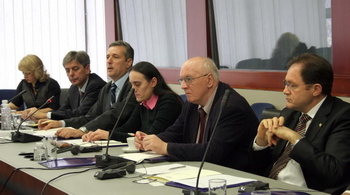- Serbia
Get to know Serbia
- Citizens
Culture and science
Health services
Pension and disability insurance
- Business
Employment
Economy
- Media
- Government
- Contact
Keep in touch
Contact form
Back
Keepin touch
Whether you have a question, comment, suggestion or any problem in the purview of the government, send us your message and we will try to respond as soon as possible. If your problem is not in our purview, we will forward your message to the relevant institution.
Q:
A:
Educational system must be harmonised with labour market needs
Belgrade,
30 November 2007
State Secretary at the Serbian Ministry of Economy and Regional Development Vladimir Ilic said today that Serbia, just as most countries in transition, has constant economic growth that ranges from 5% to 7%, and a high level of macroeconomic stability, but it lacks more jobs.
Ilic said at a conference "Business environment and labour market in Serbia" that the youth unemployment rate is as high as 48%, and that there are 300,000 unemployed without any qualifications whatsoever, while a great number of those above 45 and 50 who remained jobless do not have proper qualifications.
He said that a great capacity in new employment is in micro and small enterprises, which are those that have up to 50 employees.
Ilic recalled that the Ministry of Economy and Regional Development prepared for 2008 measures for encouraging employment, the most important of which are subsidies for opening new jobs, start-up loans and active policy measures for job searching implemented by the National Employment Service.
President of a trade union association Branislav Canak said that in Serbia interests of economy and employment are often in disharmony and that is why such situation should be changed.
In the Lisbon Strategy, which defines goals of EU economic policy, employment is the focal point and there is a good reason for that, said Canak and added that decentralisation is needed in order to increase employment in Serbia.
According to Canak, regions in the country should be enabled to handle regulations regarding employment, to raise funds on their own and take loans in order to finance employment where it is most needed.
President of the Serbian Union of Employers Rato Ninkovic said that Serbia will begin to confront real transition challenges when the number of employees in administration is reduced.
Participants at the gathering warned that the education system is in need of urgent reform so that it could become adapted to the labour market and the high rate of unemployment be lowered.
They said that meanwhile it is necessary to implement an active employment policy, through quick training and constant education of employees and those unemployed people whose qualifications are exceptionally unfavourable.
The conference was organised in cooperation with the network for improvement of business environment, ESPI Institute from Belgrade and INEKO Institute from Bratislava.
He said that a great capacity in new employment is in micro and small enterprises, which are those that have up to 50 employees.
Ilic recalled that the Ministry of Economy and Regional Development prepared for 2008 measures for encouraging employment, the most important of which are subsidies for opening new jobs, start-up loans and active policy measures for job searching implemented by the National Employment Service.
President of a trade union association Branislav Canak said that in Serbia interests of economy and employment are often in disharmony and that is why such situation should be changed.
In the Lisbon Strategy, which defines goals of EU economic policy, employment is the focal point and there is a good reason for that, said Canak and added that decentralisation is needed in order to increase employment in Serbia.
According to Canak, regions in the country should be enabled to handle regulations regarding employment, to raise funds on their own and take loans in order to finance employment where it is most needed.
President of the Serbian Union of Employers Rato Ninkovic said that Serbia will begin to confront real transition challenges when the number of employees in administration is reduced.
Participants at the gathering warned that the education system is in need of urgent reform so that it could become adapted to the labour market and the high rate of unemployment be lowered.
They said that meanwhile it is necessary to implement an active employment policy, through quick training and constant education of employees and those unemployed people whose qualifications are exceptionally unfavourable.
The conference was organised in cooperation with the network for improvement of business environment, ESPI Institute from Belgrade and INEKO Institute from Bratislava.
-
 Belgrade, 22 January 2025
Belgrade, 22 January 2025Egypt one of Serbia’s closest partners on international stage
-
 Belgrade, 9 July 2024
Belgrade, 9 July 2024Support for 104 associations in diaspora that preserve Serbian language, culture
-
 Belgrade, 15 April 2024
Belgrade, 15 April 2024Competition for StarTech grants open until 31 May
-
 Belgrade, 2 October 2023
Belgrade, 2 October 2023Serbia respects Resolution 1244 and will do everything to preserve peace
-
 Belgrade, 13 September 2023
Belgrade, 13 September 2023Day of Serbian Unity to be celebrated outside borders of Serbia, Republika Srpska for the first time
-
 Belgrade, 8 August 2023
Belgrade, 8 August 2023RSD 24.2m in state aid paid out to citizens affected by storm
-
 Belgrade, 17 June 2023
Belgrade, 17 June 2023Belgrade is doing everything to preserve peace in Kosovo and Metohija
-
 Belgrade, 15 June 2023
Belgrade, 15 June 2023Slovenia will continue to support Serbia on its way to EU
-
 Belgrade, 5 May 2023
Belgrade, 5 May 2023Emergency measures, tightening of conditions for possessing weapons
-
 Belgrade, 3 May 2023
Belgrade, 3 May 2023Three days of mourning in Serbia over tragedy at Vladislav Ribnikar primary school

